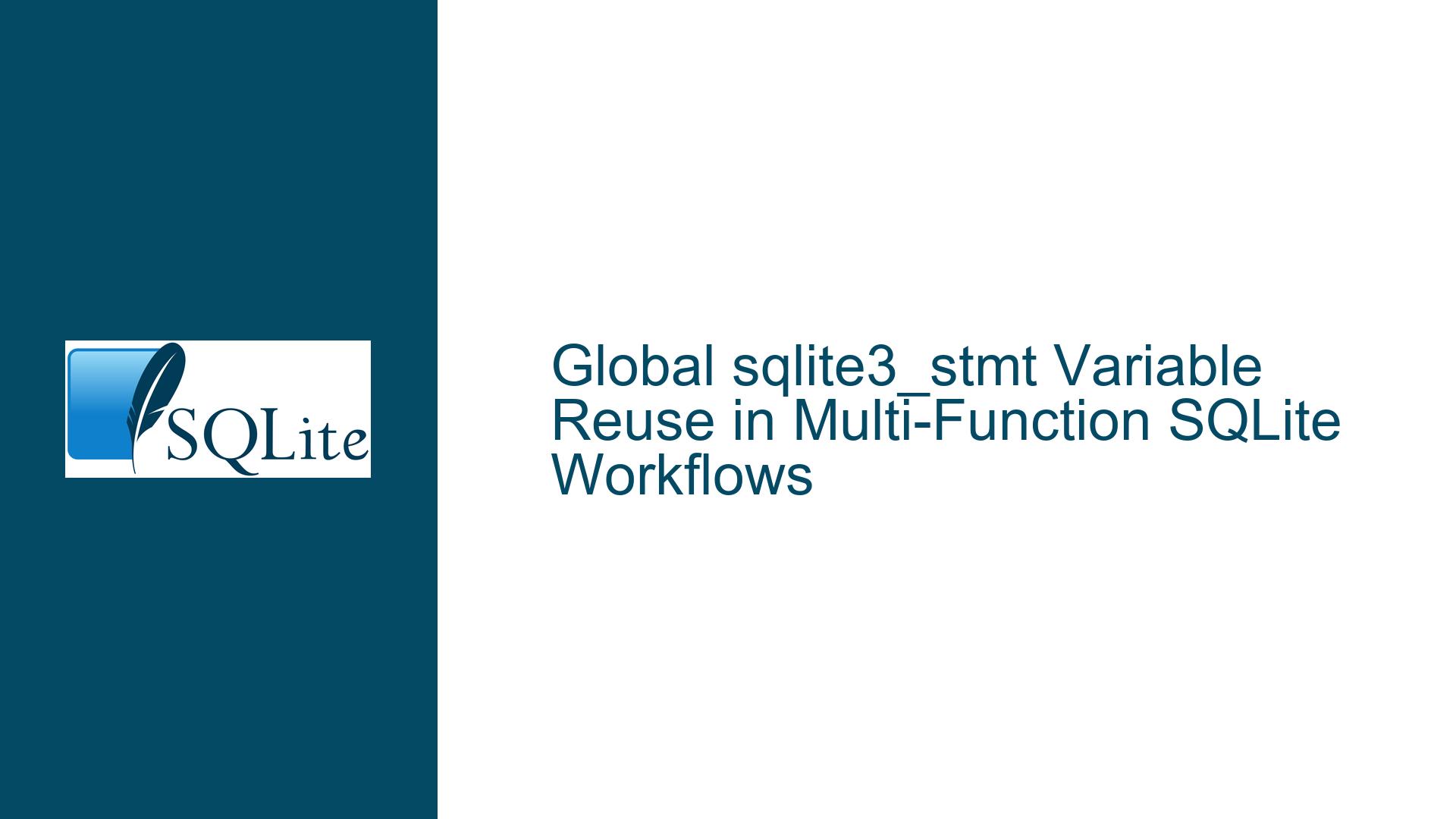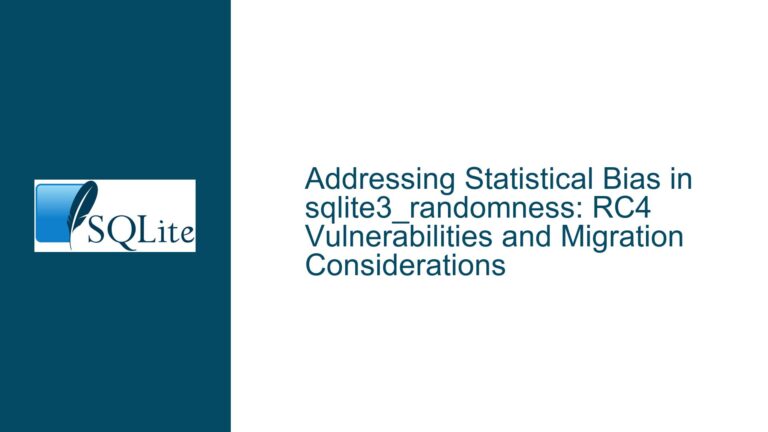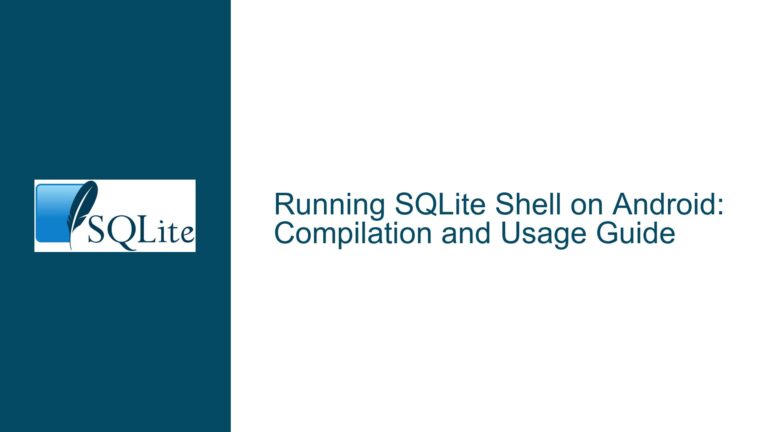Global sqlite3_stmt Variable Reuse in Multi-Function SQLite Workflows
Global sqlite3_stmt Lifecycle Management in Single-Threaded Contexts
Issue Overview
The core challenge revolves around using a global sqlite3_stmt pointer across multiple database operations in SQLite while maintaining statement integrity and preventing resource collisions. In the described scenario, a single global statement handle (sqlite3_stmt *stmt) is repeatedly prepared against different SQL queries across functions func1() and func2(), with each function finalizing the statement after use. While this pattern appears functionally correct for basic sequential execution, it introduces critical constraints and potential failure modes that demand rigorous validation.
At first glance, the code seems logically sound: each function prepares its SQL command against the shared statement handle, executes it, then finalizes the handle. However, SQLite’s prepared statement lifecycle imposes strict requirements on handle ownership and temporal isolation. The global variable becomes a shared resource with implicit state dependencies between function calls. For instance, if func1() fails to finalize stmt due to an early return after an error, func2() might inherit an invalid or partially initialized statement handle. This pattern also creates hidden temporal coupling – func2() cannot safely assume stmt is in a null state when called, even if func1() nominally finalized it.
The architecture violates the principle of resource encapsulation by exposing a low-level database construct (statement handle) at global scope. While SQLite’s API permits this at a technical level, it subverts the library’s internal management of connection-specific resources. Each sqlite3_stmt is intrinsically tied to its parent sqlite3* connection handle, and globalizing the statement handle creates undocumented cross-function dependencies on the connection’s state. This becomes particularly hazardous when transaction boundaries overlap with statement preparation – a COMMIT or ROLLBACK in one function could invalidate the global statement handle used in another.
Latent risks emerge when considering error recovery paths and control flow variations. If func1() prepares stmt but encounters a runtime error before reaching sqlite3_finalize(), the global handle remains allocated, causing func2() to operate on a zombie statement. This violates SQLite’s strict requirement that every successful sqlite3_prepare_v2() call must have exactly one matching sqlite3_finalize(), even when errors occur mid-execution. The pattern also complicates debugging, as crash dumps showing stmt’s state cannot be trivially traced to their originating function without extensive logging.
Concurrency Hazards and State Collision Risks
Possible Causes
1. Unmanaged Shared State in Sequential Execution
The global statement handle acts as a mutable singleton, creating implicit write-after-free and use-after-free risks. After func1() finalizes stmt, the pointer isn’t reset to NULL, leaving a dangling reference. While SQLite sets the handle to NULL internally during finalization, relying on this behavior is dangerous – certain error paths might leave the handle non-null even after failed preparations. Subsequent functions reusing stmt without explicit null-checking inherit an undefined handle state.
2. Thread Safety Violations in Future Scaling
Though the initial code assumes single-threaded execution, introducing concurrency transforms the global stmt into a race condition vector. SQLite connections and their associated statements are not thread-safe by default. Concurrent calls to func1() and func2() from different threads would trample the shared stmt variable, potentially double-finalizing handles or executing prepared statements against incorrect SQL commands. This violates SQLite’s strict thread safety model, which requires that statement handles never be used concurrently across threads.
3. Reentrancy Failures in Nested Function Calls
If func1() were to call func2() during its execution (directly or via callback), the nested func2() would overwrite stmt while func1() still holds an active reference. This reentrancy would corrupt func1’s statement context, leading to undefined behavior. SQLite statements are not designed for recursive use – a single global handle cannot safely service interleaved query executions.
4. Connection-State Dependency Chain Reactions
The global stmt inherits the database connection’s transactional state. If func1() starts a transaction (BEGIN) but doesn’t commit it before func2() runs, func2’s operations on stmt would occur within func1’s transaction scope. This hidden coupling violates the principle of least astonishment, as function-local operations inadvertently maintain global transactional state. Connection-level operations like sqlite3_interrupt() or schema changes could invalidate stmt across all functions.
5. Resource Leak Accumulation in Long-Running Processes
While each function nominally finalizes stmt, real-world error handling often misses edge cases. A single missed finalization due to an uncaught error leaves stmt allocated indefinitely. With hundreds of function calls, these leaks compound, risking out-of-memory conditions. Global variables obscure ownership, making leak detection via tools like valgrind more challenging, as the handle’s lifetime isn’t lexically scoped.
Mitigation Strategies and Robust Implementation Patterns
Troubleshooting Steps, Solutions & Fixes
Step 1: Enforce Strict Handle Nullification Post-Finalization
Modify all functions to explicitly reset the global stmt to NULL after finalization:
sqlite3_finalize(stmt);
stmt = NULL; // Prevent dangling pointer reuse
This guarantees subsequent prepare calls start from a null state. However, this alone doesn’t resolve the architectural fragility – it merely adds a safety check against obvious use-after-free errors.
Step 2: Implement Thread-Local Storage for Future Concurrency
If multi-threaded operation is anticipated, refactor stmt into thread-local storage:
#if defined(_MSC_VER)
__declspec(thread) sqlite3_stmt* stmt = NULL;
#else
_Thread_local sqlite3_stmt* stmt = NULL;
#endif
This isolates the statement handle per thread, preventing cross-thread collisions. However, this complicates connection sharing, as SQLite connections shouldn’t be used across threads either. A better pattern is to bundle the connection and its statements in a thread-specific structure.
Step 3: Adopt Prepared Statement Caching with Ownership Tracking
Instead of a single global stmt, maintain a cache of prepared statements keyed by their SQL text. This allows safe reuse across functions while avoiding redundant compilation:
typedef struct {
const char *sql;
sqlite3_stmt *stmt;
} StmtCacheEntry;
StmtCacheEntry cache[10] = {0};
sqlite3_stmt* prepare_cached(sqlite3 *db, const char *sql) {
for(int i=0; i<10; i++){
if(cache[i].sql && strcmp(cache[i].sql, sql)==0){
return cache[i].stmt;
}
}
// Prepare new and add to cache...
}
This pattern requires reference counting or LRU eviction to prevent unbounded memory growth. SQLite’s native statement cache (sqlite3_db_status(db, SQLITE_DBSTATUS_STMT_USED, …)) operates similarly but isn’t directly exposed.
Step 4: Enforce Lexical Scoping via RAII Wrappers
In C++, use Resource Acquisition Is Initialization (RAII) to bind statement lifetime to scope:
class ScopedStatement {
sqlite3_stmt** stmt_ptr;
public:
ScopedStatement(sqlite3_stmt** global_stmt, sqlite3* db, const char* sql) {
stmt_ptr = global_stmt;
sqlite3_prepare_v2(db, sql, -1, stmt_ptr, nullptr);
}
~ScopedStatement() {
sqlite3_finalize(*stmt_ptr);
*stmt_ptr = nullptr;
}
};
void func1() {
ScopedStatement scoped(&stmt, db, "SELECT * FROM tbl1");
// Use stmt...
} // Automatically finalized at scope exit
For C, simulate RAII using GCC’s cleanup attribute:
void auto_finalize(sqlite3_stmt **stmt) {
if(*stmt) sqlite3_finalize(*stmt);
}
#define SCOPED_STMT(stmt_var, db, sql) \
sqlite3_stmt *stmt_var __attribute__((cleanup(auto_finalize))); \
sqlite3_prepare_v2(db, sql, -1, &stmt_var, NULL)
Step 5: Instrument Debugging Guards for Handle Integrity
Embed invariant checks before each prepare/finalize:
void prepare_checked(sqlite3 *db, const char *sql) {
assert(stmt == NULL && "Statement handle not null before preparation!");
int rc = sqlite3_prepare_v2(db, sql, -1, &stmt, NULL);
assert(rc == SQLITE_OK && "Prepare failed");
assert(stmt != NULL && "Prepare succeeded but stmt is null!");
}
These assertions crash early when invariants are violated, aiding debugging. For production builds, replace with error logging.
Step 6: Transition to Connection-Per-Thread with Local Statements
For maximum safety, abandon global statements entirely. Instead, pass statement handles explicitly through function parameters:
int func1(sqlite3* db) {
sqlite3_stmt *stmt;
rc = sqlite3_prepare_v2(db, "SELECT ...", -1, &stmt, NULL);
// ... use stmt ...
return sqlite3_finalize(stmt);
}
This eliminates global state, making ownership and lifetime explicit. Combine with connection pools if managing multiple databases.
Step 7: Employ SQLITE_CONFIG_SERIALIZED Mode for Thread Safety
If transitioning to multi-threaded code, configure SQLite in serialized mode:
sqlite3_config(SQLITE_CONFIG_SERIALIZED);
sqlite3_initialize();
This allows concurrent access to the same connection across threads, but requires that all operations, including statement preparation, be externally synchronized. Global statement variables remain unsafe even in this mode – synchronization must extend to stmt access.
Step 8: Implement Retry Logic for Busy Handles
When sharing connections globally, handle SQLITE_BUSY errors by introducing controlled retries:
int execute_statement(sqlite3* db, const char* sql) {
int rc;
sqlite3_stmt *stmt = NULL;
do {
rc = sqlite3_prepare_v2(db, sql, -1, &stmt, NULL);
if(rc != SQLITE_OK) break;
rc = sqlite3_step(stmt);
// Handle stepping...
sqlite3_finalize(stmt);
stmt = NULL;
} while(rc == SQLITE_BUSY);
return rc;
}
This is safer than global retry variables, as it keeps the statement handle local.
Step 9: Audit Control Flow for Finalization Coverage
Use static analysis tools like Clang’s scan-build or Coverity to verify that all code paths through func1() and func2() reach sqlite3_finalize(). Manually inspect error-handling blocks:
int func1() {
rc = sqlite3_prepare_v2(..., &stmt);
if(rc != SQLITE_OK) {
log_error();
// MUST finalize here if prepare partially succeeded!
sqlite3_finalize(stmt); // stmt may be non-null even on error
return rc;
}
// ...
}
SQLite may return an error code yet still allocate a statement handle that must be finalized.
Step 10: Transition to High-Level Abstractions
Ultimately, the global statement approach is fragile. Wrap SQLite operations in a higher-level API that manages statements internally:
typedef struct {
sqlite3 *db;
sqlite3_stmt *read_tbl1;
sqlite3_stmt *read_tbl2;
} DatabaseContext;
void dbctx_init(DatabaseContext *ctx, const char *path) {
sqlite3_open(path, &ctx->db);
sqlite3_prepare_v2(ctx->db, "SELECT * FROM tbl1", -1, &ctx->read_tbl1, NULL);
sqlite3_prepare_v2(ctx->db, "SELECT * FROM tbl2", -1, &ctx->read_tbl2, NULL);
}
void dbctx_destroy(DatabaseContext *ctx) {
sqlite3_finalize(ctx->read_tbl1);
sqlite3_finalize(ctx->read_tbl2);
sqlite3_close(ctx->db);
}
This encapsulates statements within a context object, enabling safe reuse without globals.
By systematically addressing ownership ambiguity, concurrency hazards, and error recovery paths, developers can mitigate the risks inherent in global sqlite3_stmt usage. The optimal solution typically involves abandoning global statement handles in favor of lexically scoped or explicitly passed resources, combined with rigorous lifecycle management.






